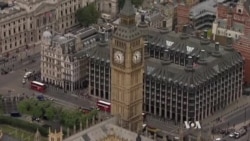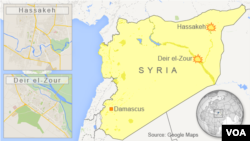After seven hours of debate Friday, British lawmakers voted overwhelmingly in favor of taking military action against the Islamic State. Lower House Speaker John Bercow announced the result.
“The ayes to the right, 524," he said. "The no's to the left, 43. So the ayes have it, the ayes have it.”
Earlier, Prime Minister David Cameron laid out his case for sending warplanes to Iraq. He said, “This is not a threat on the far side of the world. Left unchecked, we will face a terrorist caliphate on the shores of the Mediterranean, and bordering a NATO member, with a declared and proven determination to attack our country and our people.”
Though the bill only covers military action in Iraq, some lawmakers said it would inevitably lead to airstrikes on Islamic State positions in Syria.
Outside parliament, anti-war protesters staged a demonstration against military action. Critics say Britain and the West have learned nothing from the difficult campaign in Iraq after the U.S.-led invasion in 2003.
Corporal Simon Miller, 21, was one of six British soldiers murdered by an angry mob in southern Iraq in 2003. His father John says the British airstrikes will only encourage extremists plotting to attack Britain.
“It's when you're fueling fire, it's a recruiting program," he said. "And the longer that we stay out of it the better, and let those take the lead and get on with it.”
Lance Corporal Ben Hyde was killed in the same incident. His father offers a different opinion on Britain’s fight against Islamic State.
"I think certainly regards Iraq, I think, airstrikes, yeah," he said. "Any assistance that we can give, not necessarily, not boots on the ground, I think that would require a lot more thinking about and a lot more debate. But certainly anything short of that, we should give."
Islamic State militants recently beheaded British aid worker David Haines, who had been held hostage by the group since 2013.
At the family home in Scotland, his daughter Bethany reads through some of the hundreds of sympathy cards sent from around the world. She is clear about the need to tackle her father’s murderers.
“IS needs eradicating; they can't continue this way," she said. "They can't be doing this to people and getting away with it, no matter what nationality, if they're Western or not.”
Eradicating the Islamic State will entail a long campaign, says Michael Stephens, Director of the Royal United Services Institute in Qatar.
“What we [Britain] have is an ability to take the lead in a humanitarian sense, to help out with refugees, to look at rehabilitating the region, to work with all regional allies to defeat ISIS in the long run - not just the military short term position,” he said.
Six Cyprus-based Tornado GR4 fighter-bombers are on standby to take part in initial strikes and could be in action in days.
Coalition Airstrikes Against IS
Overnight airstrikes against the Islamic State, were made by a coalition that included:
- United States
- Bahrain
- Jordan
- Qatar
- Saudi Arabia
- United Arab Emirates
A combination of strike fighters, bombers, drones and Tomahawk missiles were used in the attack.
Sources: Reuters, Pentagon
Also, Denmark and Belgium on Friday became the latest countries to join the U.S.-led coalition that is launching airstrikes on Islamic State group militants in Iraq.
French Foreign Minister Laurent Fabius said on Friday that the country's policy of not intervening militarily in Syria could evolve over time but there are no plans to do so for now,
Fabius also told reporters France has delivered weapons to the moderate Syrian opposition and could provide more equipment.
France has bombed Islamic State targets in Iraq but has not taken part in U.S.-led airstrikes against the radical Sunni militant group in Syria, saying it was satisfied with this arrangement and that France's focus was on strengthening the Syrian moderate opposition.
US airstrikes overnight
Meanwhile, U.S. fighter jets, drones and other aircraft continued to pound Islamic State targets in Iraq and Syria late Thursday and early Friday.
U.S. Defense Secretary Chuck Hagel said Friday that the strikes deny Islamic State militants the freedom of movement.
Hagel said more than 200 airstrikes have been conducted in Iraq this week and 43 in Syria. He also said he spoke with Britain's defense secretary and welcomed Britain's decision to join the air campaign in Iraq.
Chairman of the Joint Chiefs of Staff General Martin Dempsey said Friday the military campaign is an Iraq-first strategy, but not an Iraq-only strategy. Dempsey said the strikes in Syria show Islamic State fighters they have no safe haven.
The U.S. Central Command, which oversees American military operations in the Middle East, said U.S. military forces conducted 10 airstrikes Thursday and early Friday against Islamic State terrorists in Iraq and Syria. A mix of fighter, attack and remotely piloted aircraft were used in the attacks.
In Iraq, five airstrikes south and southwest of Kirkuk destroyed several vehicles in use by the militants, the military reported. There were also two other airstrikes, one west of Baghdad and another near Al-Qaim, the military reported.
In Syria, three airstrikes south and southeast of Deir el-Zour destroyed four tanks used by Islamic State fighters.
The Syrian Observatory for Human Rights, a group monitoring the war in Syria, said Friday that oil facilities were the apparent target of overnight strikes in Deir el-Zour. The group said a command center for the Islamic State group was also hit.
Militants change tactics
Meanwhile, Islamic State militants are changing tactics in the face of U.S. air strikes in northern Iraq, ditching conspicuous convoys in favor of motorcycles and planting their black flags on civilian homes, tribal sources and eyewitnesses said.
The sources reported fewer militant checkpoints to weed out “apostates” and less cellphone usage by the fighters since the airstrikes intensified and more U.S. allies pledged to join the campaign that began in August. They said the militants had also split up to limit their casualties.
A tribal sheik from a village south of Kirkuk said Islamic State fighters “abandoned one of their biggest headquarters in the village” when they heard the airstrike campaign was likely to target their area.
The militants have also taken to erecting their notorious black flag on the rooftops of several mostly empty residential houses and buildings, to create confusion about their actual presence.
The human rights group did not say if any casualties occurred in the overnight attacks, though the Observatory estimated at least 140 Islamic extremists and 13 civilians have been killed in the three previous rounds of airstrikes.
The international alarm has been triggered by Islamic State militants' brutal abuses against civilians, rival fighters and Arab and Western hostages, as well as its success in recruiting Western members.
On Thursday, police in London arrested nine people suspected of links to Islamic extremists, including a notorious radical preacher.
And the FBI said it identified the Islamic State jihadist who has appeared in videos showing the beheading of two U.S. journalists and a British aid worker, though it declined to give further details.
In France, Muslims groups were planning a Friday demonstration outside Paris's main mosque to denounce the Islamic State group.
Border town under siege
Also on Friday, Islamic State fighters edged toward a strategic town on northern Syria's border with Turkey, battling Kurdish forces and sending at least two shells into Turkish territory, witnesses said.
Islamic State fighters launched an offensive to try to capture the border town of Kobani more than a week ago, besieging it from three sides. More than 140,000 Kurds have fled the town and surrounding villages since last Friday, crossing into Turkey.
In northern Syria, video posted to social media purports to show Kurdish fighters launching attacks on Islamic State targets near the town of Kobani, which for days has been the center of a struggle between the two sides.
The Sunni insurgents appeared to have taken control of a hill from where fighters of the YPG, the main Kurdish armed group in northern Syria, had been attacking them in recent days, 10 kilometers (6 miles) west of Kobani, a Reuters correspondent said.
Booms of artillery and bursts of machinegun fire echoed across the border, and at least two shells hit a vineyard on the Turkish side. There were no immediate reports of casualties in Turkey and paramilitary police arrived to inspect the site.
The U.S. news network CNN also aired live coverage from across the border in Turkey of Islamic State fighters moving across a hillside near Kobani while engaging in gunfire with what were believed to be Kurdish fighters.
Some information for this report came from Reuters and AFP.






